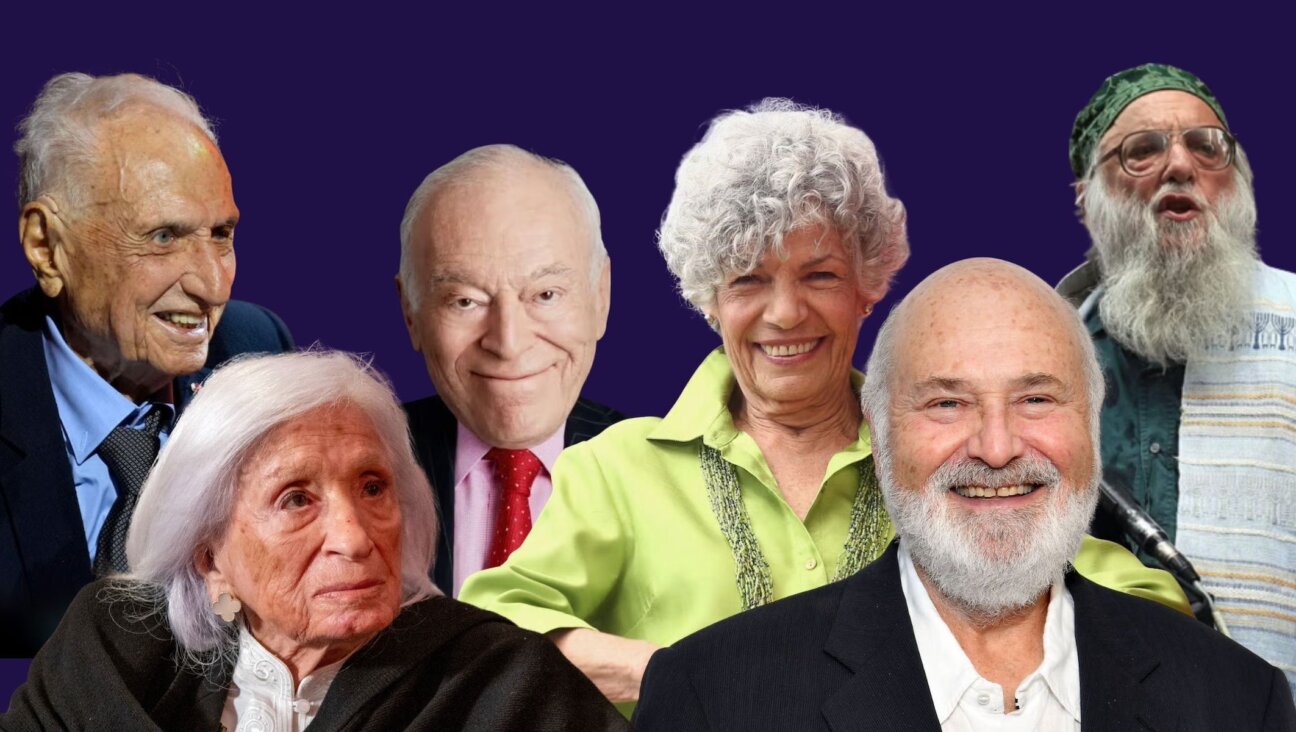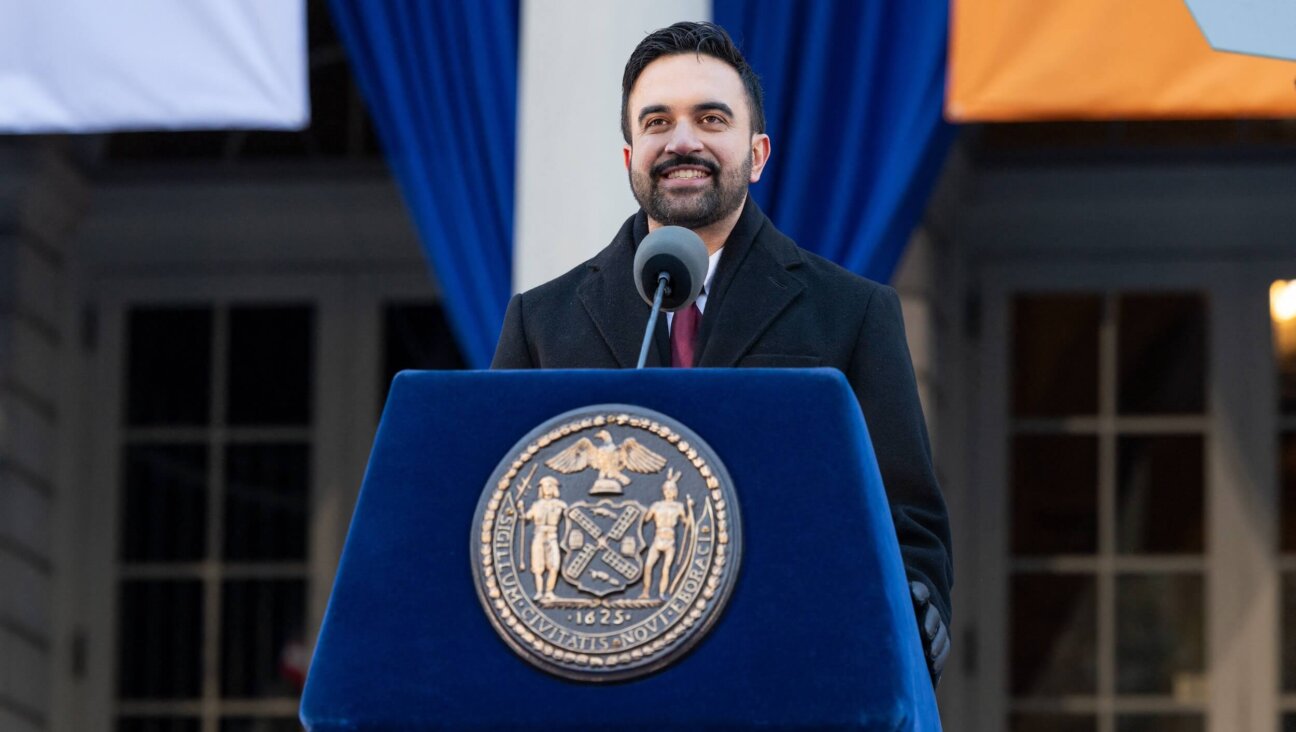Who’s Funding 5 Republican White House Candidates — and Where Do They Stand?

Image by Getty Images
(JTA) — Election Day is 19 months away, but the campaign already has begun. Aside from Democrat Hillary Clinton, three Republican candidates with reasonable chances at the nomination have declared and several others are on the cusp.
The Republican Party says it’s been making inroads with Jewish voters, who traditionally have favored Democrats by 2-to-1 margins.
Here’s a rundown of the views of three declared Republican candidates — and two likely candidates — on issues of Jewish interest, and their connections to the community.
Sen. Marco Rubio, R-Fla.
Age: 43
Campaign status: Declared candidate
His Jews: A principal backer is Norman Braman, a car dealership magnate who moved to Florida in 1994 after selling his stake in the NFL’s Philadelphia Eagles. A past president of the Greater Miami Jewish Federation, Braman has been close with Rubio since his meteoric rise through the Florida Legislature. Braman accompanied Rubio to Israel in 2010, just after his election to the U.S. Senate. Rubio’s ties to the broader Jewish community also extend back to his career in the Florida state legislature, and communal professionals credit him with being accessible.
His views: Rubio has blasted President Barack Obama on Israel, saying in his April 13 campaign launch that the administration bears “hostility” toward Israel.
When Prime Minister Benjamin Netanyahu demanded recognition of Israel as part of a final Iran nuclear deal, Rubio was quick to propose the demand as an amendment to a bill requiring congressional review of any Iran deal.
The drama that followed Rubio’s proposal, which the Obama administration declared a poison pill, is illustrative of Rubio’s tendency to move between extreme to moderate positions. He withdrew the amendment on April 14, the day the Senate Foreign Relations Committee considered the broader bill, which ultimately passed unanimously.
Similar back-and-forth characterizes his immigration record. Rubio helped shepherd comprehensive immigration reform through the Senate in 2013, but after it failed in the U.S. House of Representatives, Rubio retreated to more hawkish positions popular with the Republican base, including tougher border security. He says the reform bill he once embraced was the right way to go at the time, but now say political realities dictate a piecemeal approach.
Sen. Ted Cruz, R-Texas
Age: 44
Campaign status: Declared candidate
His Jews: Last year, Cruz tapped Nicolas Muzin, a soft-spoken Orthodox Jew from South Carolina, as an adviser. Muzin is credited with helping catapult Sen. Tim Scott, R-S.C., the first black senator elected from the South since the 19th century, to a national career. Muzin has introduced Cruz to Orthodox Jewish funders, including telecommunications and energy magnate Howard Jonas, and staged events for him in fancy kosher eateries like Abigael’s on Broadway.
His views: Cruz talks a hard line on Israel, aligning himself with some of the Obama administration’s harshest critics. After Rabbi Shmuley Boteach advertised an upcoming panel discussion on Obama’s Iran policy in March with an ad that seemed to link National Security Adviser Susan Rice to the genocide in Rwanda, one of the featured speakers, Rep. Brad Sherman, D-Calif., dropped out, saying Boteach had crossed a line. Cruz, also a featured speaker, stayed in.
Cruz likes to ask the administration tough questions on Israel. He accused the Obama administration of playing politics with the Federal Aviation Authority during last year’s Gaza War, when the FAA stopped flights to Tel Aviv for a day or so because rockets had struck near the airport. Cruz said no such order was in place for Ukraine, although a missile had downed a plane there (in fact, there was such an order).
Cruz also has sought to distance himself from neoconservative hawks, arguing that his model is President Ronald Reagan, who Cruz said favored clearly defined objectives in any military action and opposed nation building.
Cruz shares with Rubio a biography of being born to Cuban refugees from the Castro regime. Unlike Rubio, he has maintained a consistently tough line on immigration, advocating blocking Obama judicial nominees until the president retreats on executive orders that have cleared a path to citizenship for some undocumented immigrants.
Sen. Rand Paul, R-Ky.
Age: 52
Campaign status: Declared candidate
His Jews: Paul has cultivated Richard Roberts, an Orthodox Jew and major New Jersey philanthropist. In 2013, Roberts helped fund a tour of Israel for Paul and evangelical Christians. A year ago he led Paul on a tour of Lakewood, New Jersey’s sprawling Orthodox yeshiva, Beth Medrash Govoha, which Roberts supports. Roberts has suggested, however, that he favors Wisconsin Gov. Scott Walker, who has yet to formally declare his candidacy.
Paul also shares with Netanyahu a digital consultant, Harris Media in Austin, Texas. Vincent Harris, the firm’s CEO, led digital strategy in Netanyahu’s recent reelection campaign and is now chief digital strategist to Paul’s campaign.
His views: Paul’s father is the former Rep. Ron Paul, a Texas Republican who ran several times for president on a libertarian platform that included cutting off aid to Israel. The elder Paul also was notorious for his broadsides against the pro-Israel community, and newsletters published under his name veered into anti-Semitism, although he has denied authoring the content.
When Rand Paul ran for Senate in 2010, he would not return calls from Kentucky Jewish leaders asking for a meeting. At first, Paul seemed to mirror his father’s positions, telling CNN in an interview that he would include Israel in his pledge to cut off all foreign assistance.
Since then, Paul has been more open to Jewish outreach and has visited Israel. Republican Jews like to say his views on the country have “evolved”; he still counsels cuts in foreign assistance, but adds that these should be prioritized, with countries he deems hostile to U.S. interests first on the list.
Paul counts Israel as a close U.S. ally, and the sole focus of the Israel page on his campaign website is his bill to cut assistance to the Palestinian Authority precisely because of its parlous relations with Israel. (The American Israel Public Affairs Committee, notably, does not support the bill.)
Pro-Israel groups remain wary of Paul in part because he is one of two Republicans in the Senate who will not back bills seeking greater congressional involvement in the Iran nuclear talks — the other is Sen. Jeff Flake of Arizona.
Paul is a relative moderate in his party on immigration, favoring legal status short of citizenship for undocumented immigrants.
“People who seek the American dream are not bad people,” he said a year ago.
Wisconsin Gov. Scott Walker
Age: 47
Campaign status: Likely candidate
His Jews: Walker has yet to declare, but if and when he does, the New Jerseyan Roberts would appear to be in his camp. Walker has also been backed in his gubernatorial runs by Sheldon Adelson, the casino magnate and Republican Jewish kingmaker. A Hanukkah greeting last year to a Jewish constituent was infamously signed “Molotov” — he meant “Mazel tov.”
His views: Walker has earned his conservative chops principally on the basis of his record as a governor facing down unions in a liberal state. He now wants to burnish his foreign policy credentials and traveled to London in February, but got demerits for dodging foreign policy questions. He says he wants to travel to Israel soon. His criticisms of how Obama has handled the Israel relationship and the Iran nuclear talks have been pointed in their language but vague in particulars.
On immigration, Walker has backed reforms that include a path to citizenship for undocumented immigrants, but more recently his focus has been on seeking to dismantle Obama’s executive orders that would provide such a path.
Former Florida Gov. Jeb Bush
Age: 62
Campaign status: Likely candidate
His Jews: Bush has been able to tap into a broad network of fundraisers who were loyal to the presidencies of his brother George W. and his father, George H.W. Among the former are Mel Sembler, a shopping mall magnate in Florida who backed Bush during his gubernatorial runs. In New York, equity billionaire Henry Kravis hosted a lucrative evening for Bush in February.
Bush also has Jewish George W. Bush Cabinet members on his foreign policy team, including Michael Chertoff, the former Homeland Security secretary, and Michael Mukasey, the ex-attorney general who has been notable in his post-Bush career for his strident criticism of what he depicts as the spread of radical Islam. More controversially, Bush takes advice from his father’s secretary of state, James Baker, who angered conservatives last month when he delivered a speech critical of Netanyahu at J Street’s annual conference. Bush has distanced himself from the speech, although not enough to please Adelson, who reportedly was “incensed” by Baker’s speech.
Bush’s rivalry with his one-time protege Rubio and his closeness to Baker have put him in an odd position: He has the enthusiastic backing of some prominent Jewish GOP backers, like Sembler and Kravis, while others, like Adelson and Rubio’s backer Braman are lining up to keep him from winning the GOP nod.
His views: Bush has been critical of how Obama has handled nuclear talks with Iran, blaming him for allowing differences with Israel over the talks to spill out into the open. He has visited Israel five times.
On immigration, Bush, who speaks fluent Spanish and whose wife, Columba, was born in Mexico, has been perhaps the most outspoken about embracing immigration reform and a path to citizenship for undocumented immigrants. He has made a point of forcefully making the case even in front of those groups most likely to oppose such reforms.














